

On the morning of June 27, the 7th International Symposium on Development and Governance in the BRICS was held at Fudan University, during which the Advisory Committee for the Professional Degree Programs of the Fudan Institute for Global Public Policy (IGPP) was also established.
The Symposium centered on the theme “Climate Governance and BRICS+,” fostering collective action among BRICS countries to tackle climate change through keynote speeches, sub-forum discussions, MPA program workshops, and young scholars’ roundtables.
Xin Qiu, Chairman of the University Council of Fudan University, and Mohamad G. Alkadry, President of the Network of Schools of Public Policy, Affairs, and Administration (NASPAA), delivered speeches.
Chairman Qiu highlighted that Fudan, as one of China’s earliest universities engaged in BRICS-related research and talent development, has advanced multidisciplinary studies through platforms such as IGPP. He stressed that the Symposium provides an important opportunity to draw on Fudan’s disciplinary strengths to foster interdisciplinary and transnational exchanges. Looking ahead, Fudan aims to further explore avenues of cooperation among BRICS countries in fields such as technological innovation and remains committed to promoting mutually beneficial development.

Chairman Qiu and President Alkadry jointly presented appointment letters to the newly formed Advisory Committee for the Professional Degree Programs at IGPP. The committee members appointed were Xizhe Peng, Guoyu Wang, Mei Tian, Xu Tang, Wen Chen, Chunkui Zhu, Haoqi Qian, Ke Shen, and Yijia Jing.
IGPP has introduced a two-year English-taught IMPA program designed to cultivate mid-level professionals for the global public sector and related organizations. The program integrates cutting-edge international knowledge with China’s local public management practices.
Focusing on Climate Governance and BRICS Cooperation
At the opening ceremony, keynote speeches were delivered by President Alkadry, Dean Warren Mabee of the School of Policy Studies at Queen’s University, Canada, and Associate Professor Haoqi Qian of IGPP.

President Alkadry emphasized the importance of collaborative networks in advancing public policy and administration. In an era of globalization, governance and policymaking increasingly transcend national boundaries. While networks cannot erase differences, they enhance capacity building by allowing one region’s strengths to support development elsewhere. Global platforms—such as the China-Arab Network for Schools of Public Policy and Administration (CANSPPA)—provide vital spaces for exchange and innovation. By sharing knowledge and embracing diverse perspectives, he noted, we can build governance and education systems responsive to both present and future challenges.

Dean Mabee presented a data-driven analysis of renewable energy development in BRICS countries. He observed that in recent years, BRICS nations have experienced rapid growth in installed renewable energy capacity. However, these countries also face major challenges in their energy transitions, underscoring the need for stronger international cooperation and the forging of alliances with diverse partners.

Associate Professor Qian examined carbon pricing mechanisms as part of the pathways toward carbon neutrality. He highlighted that China currently operates seven pilot emissions trading systems alongside a national carbon market, which have proven effective in reducing emissions. Yet, he cautioned that national-level carbon pricing alone is insufficient to tackle global emissions. At present, less than 30% of global emissions are covered by carbon pricing, with wide disparities in national pricing levels. To meet the challenge of climate change, deeper international cooperation is needed to advance the development of an effective global carbon pricing framework.
IGPP–NAPA Joint Study Releases New Updates
Daniel Guttman, Fellow of the National Academy of Public Administration (NAPA), presented the latest progress of the climate adaptation governance project. He explained that the project seeks to examine national practices through cross-country comparative studies, with the goal of helping countries better respond to the growing challenges of climate change.
Professor Guttman emphasized that climate adaptation governance differs from greenhouse gas mitigation. It demands reforms in governance structures, the optimization of policy instruments, and the mobilization of diverse resources. Unlike mitigation, adaptation is inherently localized and must address the complex interactions between human and natural systems. Despite the many challenges it presents, climate adaptation governance also creates opportunities for mutual learning and international cooperation.
In April 2024, IGPP and NAPA jointly released a research report titled Adapting to the Impacts of Climate Change: A Comparative Study of Governance Processes in Australia, China, and the United States. The report aims to establish a transnational policy comparison framework to support both scholars and policymakers. Initiated by NAPA and IGPP, the project brings together nearly 30 scholars and practitioners from Australia, China, and the United States, representing diverse disciplinary backgrounds.
This year’s Symposium was co-hosted by Fundação Getulio Vargas (Brazil), the Higher School of Economics (Russia), the Indian Institutes of Management (Raipur and Ahmedabad), Fudan University (China), and the University of the Western Cape (South Africa), with IGPP serving as the organizer.
Since hosting the inaugural International Symposium on Development and Governance in the BRICS in 2016, Fudan has convened the event seven times. Over the years, the Symposium has generated innovative and influential insights on government modernization, administrative reform, international development, public sector innovation, and policy capacity.




